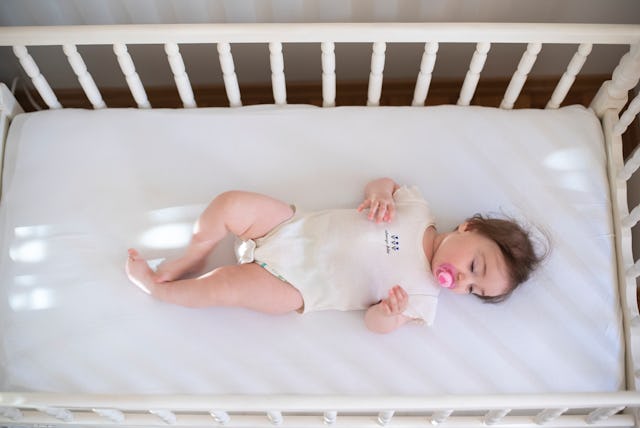A Mourning Mom And Scientist Has Likely Pinpointed The Exact Cause Of SIDS
A breakthrough study has likely determined the cause of Sudden Infant Death Syndrome, a discovery that could save lives in the future.

Sudden Infant Death Syndrome (SIDS) has been documented throughout history and even appears in the Bible — but until now, no answer for what causes SIDS has been pinpointed, though it’s been associated with everything from infant sleep practices to lifestyle choices.
Now, a new and groundbreaking study, conducted by a scientist who lost a baby to SIDS almost 30 years ago, has likely found a solid answer that will greatly help the study of the syndrome in the future. The study took place at The Children's Hospital Westmead in Sydney and is published in the latest volume of The Lancet’s eBioMedicine, the upcoming June 2022 issue.
Researchers discovered an outlier characteristic of SIDS victims.
For years, scientists have believed that SIDS — the sudden death of an infant during sleep in its first year — is tied to a malfunction that causes some babies not to startle or wake if they stop breathing while sleeping. But until now, no one knew exactly what was causing that malfunction. This study has pinpointed that the enzyme butyrylcholinesterase (BChE) — an enzyme vital to the brain’s arousal pathway — is significantly lower in babies who died of SIDS.
For the study, researchers analyzed dried blood samples of 722 babies — 67 of whom died from SIDS along with 10 blood samples of babies who shared the same date of birth and gender as one of the babies with SIDS listed as their cause of death. The samples were collected as part of a newborn screening program.
The results showed that that babies who died of SIDS had much lower levels of BChE days after birth.
Dr. Carmel Harrington, the lead author of the study, lost her son Damien to SIDS 29 years ago. She was told to “go home and enjoy [her] living babies and have more.” Instead, she quit her job as a lawyer and returned to her former career as a research biochemist. Since then, she has dedicated her research to finding a cause for his death.
“Babies have a very powerful mechanism to let us know when they are not happy,” Harrington told The Sydney Children’s Hospital Network. “Usually, if a baby is confronted with a life-threatening situation, such as difficulty breathing during sleep because they are on their tummies, they will arouse and cry out. What this research shows is that some babies don’t have this same robust arousal response.”
Leave it to a grieving mother to solve a mystery that has been eluding scientists for decades.
New research also adds reasoning behind SIDS deaths.
According to a January 2023 report published in JAMA Network Open, researchers found — after 39 years of continual research — that siblings of infants who died of SIDS had a fourfold higher risk of dying suddenly compared with the general population.
The large study reinforces earlier research that shows SIDS may be more of a medical problem than had been thought, said Dr. Richard Goldstein, director of the Robert’s Program on Sudden Unexpected Death in Pediatrics at Boston Children’s Hospital.
The study identified 2,384 siblings of 1,540 infants who died from SIDS among 2.6 million births in Denmark between January 1978 and December 2016. Researchers found that after one year, eight siblings died of SIDS at a median age of 2.5 months.
SIDS has been a mystery for decades.
According to the CDC, 1,250 infants died of SIDS in 2019, and the syndrome is responsible for over a third of unexpected infant deaths. SIDS deaths have gone down in recent years with the help of eliminating other related factors, like tummy sleeping and parental smoking. Still, thousands of babies around the globe are senselessly lost each year.
"Nobody could tell me,” Harrington, who has a PhD in Sleep Medicine from Sydney University, told Australian Broadcasting Corporation (ABC). “They just said it's a tragedy. But it was a tragedy that didn't sit well with my scientific brain.”
Families are finally finding peace in their grief.
In the past, many grieving SIDS families have dealt with guilt — and with simply not understanding what happened to their child.
"These families can now live with the knowledge that this was not their fault," she said.
While this breakthrough is extremely important, it won’t immediately lead to fewer deaths. But it opens the door to more research and more breakthroughs in the future.
“This discovery changes the narrative around SIDS and is the start of a very exciting journey ahead,” Harrington told The Sydney Children’s Hospital Network. “We are going to be able to work with babies while they are living and make sure they keep living.”
All of the funding for the study was provided by a crowd funding campaign.
This article was originally published on